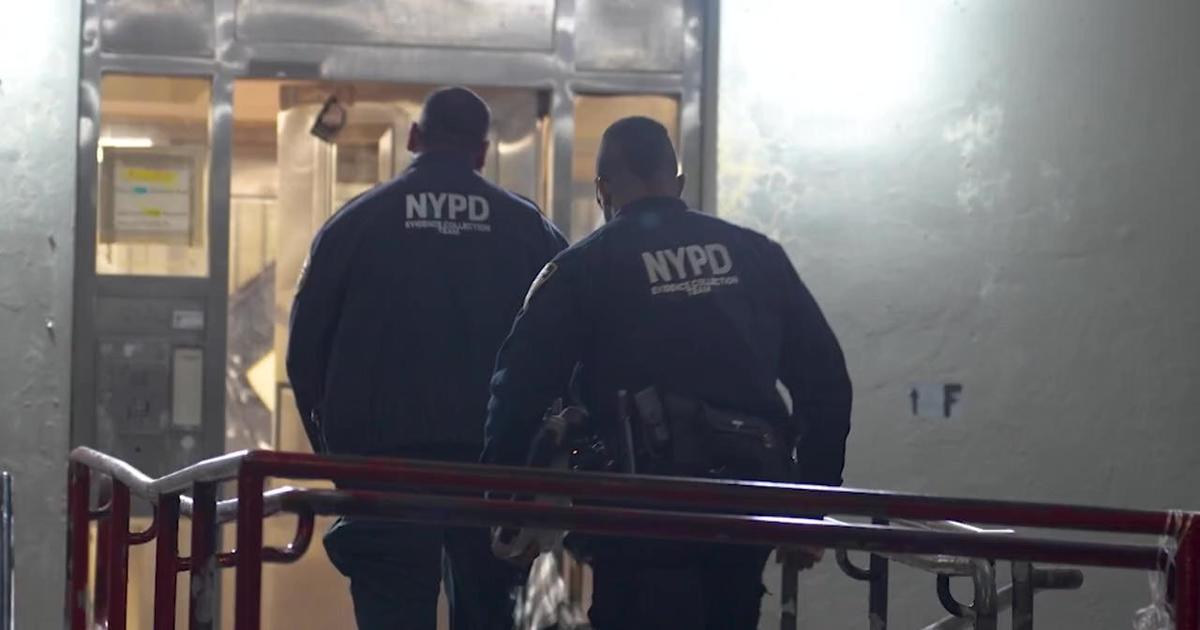Battered Woman's Defense Brings Mixed Results
NEW YORK (AP) -- The day Barbara Sheehan shot her husband to death, she said, she was trying to leave him.
She had hidden cash because he often took her wallet. She had told him she wasn't traveling with him to Florida. That made him angry, she said, so angry he threatened to kill her, which happened frequently during her 17-year marriage, but something about the way he said it this time terrified her.
The retired sergeant, who usually had two loaded guns on him, had pointed one at her head, she said.
But Raymond Sheehan never fired a shot. Hours later, as he shaved in the bathroom, his larger handgun on the vanity by his side, Sheehan took his smaller gun from the bedroom and pulled the trigger. Prosecutors say she fired 11 times, unloading the smaller gun, then reached for the bigger one. She has been charged with murder and her trial is in its third week.
Barbara Sheehan says it was self-defense, the culmination of a lifetime of abuse, and her children have given emotional testimony of their father's sustained violence.
Such a legal approach is known as the battered woman's defense, and it has mixed results. In recent cases in Maine and Tennessee, women convicted of shooting their husbands to death have served little to no time. It is difficult to persuade a jury to acquit women like, Sheehan, experts say, in part because of a lack of understanding about why women stay in abusive relationships.
"Anything a woman does or doesn't do is going to be used against her. If it was so bad there, why didn't she leave?" said Sue Osthoff, the director of the nonprofit National Clearinghouse for the Defense of Battered Women. "What we still find after all this time ... is the only correct woman in a situation claiming self-defense is a dead one."
Battered women accused of killing their partners in self-defense are convicted at about the same rate as others accused of murder, Osthoff said. Other women charged with assaulting or killing their abusive partners plead guilty, unable or unwilling to go through a difficult, public trial. Those who do, like Sheehan, are portrayed as flawed for not leaving or seeking help, especially as methods of coping with domestic violence proliferate, she said.
"A long time ago, the question was, 'Why didn't she leave?" That question is still asked, but now it's: 'She should've left because I know there is a shelter in our community."'
Though there is a growing understanding that victims of domestic violence may have no choice but to kill or be killed, juries don't always see it that way, said Holly Maguigan, a law professor at New York University Law School who specializes in abuse cases.
"People who haven't been through it don't understand it," she said. "We like to think that home is safe."
For example, in Sheehan's trial, Assistant District Attorney Debra Pomodore has sought to show that the two had a rocky, but often happy marriage and the slaying was motivated by money and anger over her husband's suspected infidelity. She has repeatedly noted that neither Sheehan nor her children ever called 911, nor reported the abuse. There are no photos documenting bruises or blood.
But Sheehan and her children, Raymond and Jennifer, testified on Raymond Sheehan's consistent threats and physical and verbal abuse, saying he created a culture of fear at home. They said they never told anyone, especially the police, because he said he would kill them if they did.
Raymond Sheehan, 49, put on a nicer face for the public, his children said. Friends testified the couple seemed normal and happy, and they did not suspect anything violent at home.
Similarly, no one suspected that problems with the marriage of Mary and Matthew Winkler, a Church of Christ minister in Selmer, Tenn. But Mary Winkler said her husband was full of rage and controlling and pressured her to perform "unnatural" sexual acts. She was convicted of voluntary manslaughter for shooting her husband to death in 2006. A psychologist testified she suffered from post-traumatic stress syndrome because of domestic abuse coupled with emotional damage from the death of a favored sister years earlier. She served only five months in jail, followed by two months in a mental institution.
Amber Cummings was charged with murder in the shooting death of her husband in Belfast, Maine, in 2009 and initially pleaded not guilty.
She also used the battered woman's defense, claiming she killed her husband to protect herself and their daughter, who was 9 at the time. Her attorney graphically described how James Cummings ridiculed, abused and debased his wife during their decade of marriage. She eventually agreed to plead guilty to manslaughter, was given a suspended sentence and served no jail time.
In everyday marriages there are periods of calm, and times of fighting and unhappiness. In an abusive relationship, those patterns are amplified, said Chitra Raghavan, an associate professor of psychology at the John Jay College of Criminal Justice. Some women become paralyzed. How would they get away, find a place to live, and protect their children while under siege from their partner?
There's reason to be fearful, she said. Women who leave abusive relationships are more likely to be killed than women who stay.
"It's actually realistic to think she's going to be badly hurt if she's going to leave the guy," she said. "It's not just realistic, it's factual."
Another week of testimony is expected in Queens State Supreme Court on the Sheehan case.
The morning of the shooting, Feb. 18, 2008, Sheehan's husband pulled her out of bed and threw her outside in the winter cold in her pajamas, she testified. She said he wouldn't let her back in the house until she agreed to go with him to Florida, and had pointed the gun at her head.
As the day wore on, she made plans to leave. She testified that tried to pretend she was going about her day as usual. She proofread her son's school paper, drank coffee and made arrangements for the trip.
She said she planned to tell her husband she was going to get dog food but never come back. Instead, she saw the revolver in the bedroom, took it and walked toward her husband. He was in the bathroom, recently showered, the Glock by his side on the vanity.
Barely understandable through tears, her head down, her face in her hands, shielding her eyes, Sheehan testified that she fired.
"I could see his face, and his eyes, and his hand and the gun," she said, her voice rising with every word. "I knew he was going to kill me."
(Copyright 2011 by The Associated Press. All Rights Reserved.)



